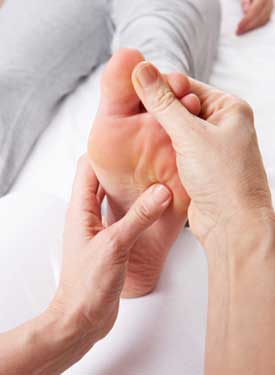Plantar Fasciitis Treatment in Richardson, TX

What is Plantar Fasciitis?
Plantar fasciitis is a condition that occurs when the plantar fascia—the ligament that supports your foot arch—becomes strained. This condition causes pain in your heel or the bottom of your foot and is the most common cause of general heel pain. This condition is most common in middle-aged men and women, but it can occur at any age depending on lifestyle choices.
The plantar fascia is the flat band of tissue that connects the heel bone to your toes. When the plantar fascia becomes strained, it weakens, becomes inflamed and is very painful. The pain typically results from physical activity like running or walking after long periods of inactivity.
Causes and Symptoms
The cause of plantar fasciitis is not well understood, but it's believed that gait abnormalities add too much stress and pressure on the heel bone and the soft tissues that attach to it, causing the plantar fascia to strain. Patients who wear non-supportive footwear on hard surfaces also put abnormal strain on the plantar fascia, which frequently leads to plantar fasciitis.
Under normal circumstances, the plantar fascia stretches as your foot strikes the ground. If the plantar fascia is strained, it becomes weak, swollen and irritated. Patients typically notice pain at the bottom of their heel or heels when they first wake up in the morning or after strenuous physical activity. Other symptoms of plantar fasciitis include:
- Pain that worsens as you climb stairs or stand on your toes
- Stiffness and pain after long periods of rest
- Pain that occurs at the beginning of exercise, gets better during exercise and returns when it's complete
- Pain after standing for long periods of time
Diagnosis and Treatment
To diagnose plantar fasciitis, your doctor will start by gathering a comprehensive patient history. A physical examination of the affected foot or feet will also be conducted. The doctor will examine the heel, looking and feeling for signs of tenderness and swelling.
Once the physical exam is complete, your doctor may ask you to walk, stand on one foot or do other physical exams that test walking gait. Generally, x-rays are not used in diagnosing plantar fasciitis, but your doctor may take one to check for a stress fracture, bone cyst, or other foot and ankle problems.
There are surgical and non-surgical options available for treating plantar fasciitis, and the treatment method used depends on the severity of the condition. Home remedies like applying ice to the foot, stretching and anti-inflammatory drugs are all quick ways to relieve pain, but they will not treat the condition. Over 90% of patients respond to non-surgical podiatric treatment methods. Some of these treatments include:
- Custom foot orthotics : Irritation from biomechanical foot deformities can stretch or pull on the plantar fascia, and custom orthotics can correct problems caused by foot deformities.
- Injection therapy: Injections such as steroids or cortisone may be used to provide temporary pain relief.
- Night splints: Wearing a splint at night helps stretch the calf muscle and arch the foot. The splint holds the plantar fascia and Achilles tendon in a lengthened positon overnight, which facilitates stretching.
- Walking cast: A cast may be applied from below the knee to the toes so the patient does not put weight on the affected foot.
- Physical therapy : This type of therapy uses a series of exercises designed to stretch the plantar fascia and the Achilles to strengthen lower leg muscles, which stabilize the ankle and heel.
Although most patients respond to non-surgical treatments, a small percentage may require surgery. If you are someone whose symptoms don't improve after six to 12 months using non-surgical treatments, your doctor may recommend plantar fascia release surgery. This procedure involves cutting part of the plantar fascia ligament to release the tension and relieve the inflammation of the ligament.
Request more information about plantar fasciitis treatment today. Call (817) 203-2760 or contact The New You Medical & Infusion Clinic online.
The New You Medical & Infusion Clinic
Address
100 Grapevine HwyHurst, TX 76054
(817) 203-2760
https://www.newyoumedclinic.com/
Hours
Mon:
10:00 am - 6:00 pm
Tue:
10:00 am - 6:00 pm
Wed:
10:00 am - 6:00 pm
Thu:
10:00 am - 6:00 pm
Fri:
Closed
Sat:
Closed
Sun:
Closed

